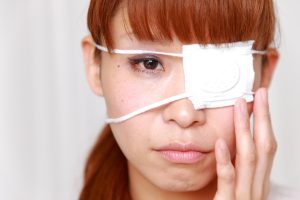Have you or a loved one experienced an eye injury that could’ve been avoided? Are you looking to make a claim? If the answer is yes, please keep reading our helpful eye injury claims guide and find out when you may have an eligible case. Due to the importance of eyesight, we appreciate that eye injuries can cause severe distress and trauma to your life. Consequently, this guide aims to provide you with all the information you will need to know about making an eye injury claim.
What You Need To Know
- You could claim for the financial losses you suffered as a result of your injuries
- You will need to provide evidence of the accident, such as CCTV footage and medical records, to make your claim
- You could make a claim if you experienced an eye injury from an assault
- You will generally have up to 3 years to start your claim
- You could receive regular case updates and an independent medical assessment if you’re connected with one of our solicitors
At Accident Claims, our advisors work around the clock to answer any questions you may have about personal injury compensation claims. As part of the free services we provide, you could receive a free eligibility assessment to look at the merits of your claim. To learn more about starting your claim, please contact us:
- Call us on 0800 073 8801
- Use our free live chat feature
- Contact us by filling out our online form
Frequently Asked Questions
- Can I Make An Eye Injury Claim?
- What Types Of Eye Injuries Can I Claim For?
- How Much Compensation Could Be Awarded In Eye Injury Claims?
- Is There A Set Time I Have To Claim For An Injured Eye?
- How Can I Prove My Eye Injury Was Caused By Negligence?
- No Win No Fee Eye Injury Claims
- Why Choose Accident Claims
- Learn More
Can I Make An Eye Injury Claim?
Yes, you could make an eye injury claim provided that you meet the eligibility requirements. To illustrate, you must satisfy the following criteria:
- You were owed a duty of care
- This duty of care was breached
- You suffered an avoidable eye injury as a result of the breach
Therefore, if you’ve suffered from an eye injury as a result of a third party’s breach of duty of care, you could make a claim. For instance, there are many scenarios where a duty of care such as the following:
- On roads
- At work
- In public places
- In healthcare
Please keep reading our useful guide to find out how you could claim for eye injuries in the above scenarios. To discuss your eligibility further, please contact one of our friendly advisors today.
What Types Of Eye Injuries Can I Claim For?
There are various types of eye injuries you could claim for such as:
- Complete blindness
- Partial blindness
- Nerve damage
- Damage to the corneas
These eye injuries could also be suffered in various situations. Below, we share some examples and the duty of care you are owed in each.
Road Traffic Accidents
If you’ve sustained an eye injury in a road accident that wasn’t your fault, you could be eligible to make a road traffic accident claim.
All road users owe one another a duty of care to navigate the roads safely and to avoid causing harm to others. Furthermore, under their duty of care, road users should conform to the Highway Code and the Road Traffic Act 1988. For instance, road users should comply with pedestrian crossings and speed limits.
You could experience an eye injury as a result of a road traffic collision in the following ways:
- You may have suffered eye nerve damage due to a head-on collision with another driver who tried to overtake another vehicle without checking that it was clear to do so. Consequently, you could experience extreme pain and temporary blindness as a result of this.
- Another driver could fail to stop in time due to speeding while you are using a pedestrian crossing, knocking you to the ground. As a result, you could experience a head injury and retinal detachment.
Accidents At Work
If you suffered with an eye injury at work that could’ve been avoided, you could be eligible to make an accident at work claim.
All employers have a duty of care to take reasonable steps to ensure the safety of their employees under the Health and Safety at Work etc Act 1974. For example, employers should conduct regular machinery checks and staff training meetings as part of their duty of care.
You could therefore experience an eye injury in the workplace in the following ways:
- You may not have been provided with any safety goggles from your employer whilst welding metals in the workplace. As a result, hot sparks could reach your eyes, causing burns and vision loss.
- There could be a faulty machine that hasn’t been checked in over a year by your employer. This results in loose debris hitting your eye, scratching your cornea and affecting your vision. Consequently, you could suffer from post-traumatic stress disorder and severe pain.
Public Place Accidents
If you’ve suffered an eye injury in a public place that wasn’t your fault, you could be eligible to make a public liability claim.
Occupiers (those in control) of public spaces have a duty of care to ensure the reasonable safety of visitors to their premises. This duty of care is set out by the Occupiers’ Liability Act 1957.
Therefore, you could make a public liability claim if you experienced an eye injury due to an occupier’s negligent actions. For example, you could experience the following:
- You could have tripped and fallen over uneven flooring at a restaurant, causing a head injury and resulting in eye injury. Accordingly, you could experience pain from an eye trauma and psychological effects such as depression.
- You may have experienced an eye injury if you were hit by a falling object in a supermarket For instance, items may not have been stored correctly on top shelves, which can cause them to fall. Consequently, you could suffer from severe bruising and pain.
Medical Negligence
If you experienced harm to your eye at the hands of a healthcare professional, you could be eligible to make a medical negligence claim.
All healthcare professionals have a duty of care to meet the minimum expected standard of care when treating patients. In doing this, healthcare professionals should prescribe correct medications and listen to patients’ symptoms as part of their duty of care.
You could therefore bring a medical negligence claim if you suffered avoidable harm to your eye as a result of a healthcare professional’s negligent actions or inactions. To illustrate, you could suffer the following:
- You could experience wrong-site surgery from a surgeon operating on the wrong eye during a cataract operation. As a result, you could make a surgical error claim due to your unnecessary pain and PTSD.
- You could experience poor post-operative care as a result of a glaucoma operation. Consequently, you could suffer from eye infections and require future surgeries.
Assault
If you’ve experienced an eye injury due to an assault, you could make a criminal injury claim through the Criminal Injuries Compensation Authority (CICA.)
For instance, you may have experienced the following:
- You may have been non-provokingly attacked by a third party and suffered Actual Bodily Harm (ABH) to your eye as a result. You may also experience permanent blindness and depression due to the incident.
- You may have experienced broken glass in your eye as a result of a third party smashing a bottle over your head in an assault incident. Consequently, you could experience chronic pain, bleeding and temporary blindness.
To discover more about how you could claim for criminal injury compensation, please contact one of our friendly advisors today.
How Much Compensation Could Be Awarded In Eye Injury Claims?
In successful eye injury claims, you would receive general damages as part of your settlement. Ultimately, general damages will aim to reimburse you for any pain and suffering you endured as a result of the injuries you have suffered.
The Judicial College Guidelines (JCG) may be referred to when assigning a value to your injury. This is because this document contains compensation guidelines for various severities of different injuries.
All entries in the table below, apart from the first entry, have been taken from the JCG for common eye injuries. Please note that they are merely guidelines and do not provide a guarantee of how much you will receive.
| Injury | Notes | Compensation Guidelines |
| Multiple severe injuries plus special damages | More than one kind of serious injuries with special damages such as loss of earnings | Up to £500,000+ |
| Total Blindness | A complete loss of sight in both eyes. | In the region of £327,940 |
| Loss of Sight in One Eye with Reduced Vision in the Remaining Eye (i) | Where there is a serious risk of further deterioration in the remaining eye. | £117,150 to £219,400 |
| Loss of Sight in One Eye with Reduced Vision in the Remaining Eye (ii) | Where there is a reduced vision in the remaining eye and or additional problems such as double vision. | £78,040 to £129,330 |
| Total Loss of One Eye | The award amount will depend on factors such as the claimant's age, the psychological impact and the cosmetic effect. | £66,920 to £80,210 |
| Complete Loss of Sight in One Eye | The higher amount considers scarring around the eye which may have happened due to the injury | £60,130 to £66,920 |
| Serious But Incomplete Loss of Vision (One Eye) | Injuries include constant double or blurred vision | £28,900 to £48,040 |
| Minor But Permanent Impairment | Where one or both eyes are affected. For instance, there may permanent light sensitivity | £11,120 to £25,600 |
To find out how much compensation you could receive for your unique situation, please contact us today.
How Is Eye Injury Compensation Calculated?
Following successful eye injury claims, you could receive both general and special damages as part of your compensation payout. Unlike general damages, special damages will reimburse you for any financial losses you experienced as a result of your injuries. For instance, you may have incurred out-of-pocket expenses for long-term physiotherapy sessions and travel costs.
Please see the following examples of special damages that you could include in your claim:
- Loss of earnings
- Childcare costs
- Home modification costs
- Travel expenses
- Medical expenses, such as paying for eye surgeries
Moreover, it’s vital that you support any special damages with evidence to include them in your claim. Evidence could be provided in the following forms:
- Receipts
- Bank statements
- Invoices
- Payslips
To find out what special damages you could claim for, or to learn more about how compensation is calculated in eye injury claims, you can contact our advisors.
Is There A Set Time I Have To Claim For An Injured Eye?
Typically, you will have up to 3 years to start your claim for eye injury compensation. As per the Limitation Act 1980, this date runs from:
- The date of the accident or negligent treatment or;
- In medical negligence scenarios, the date of knowledge. This means the date that you realised the harm you suffered was due to negligent care
However, there are two exceptions to this time limit, which include:
- If the claimant is a child, they cannot make an independent claim. The 3-year time limit will therefore begin on their 18th birthday.
- If the claimant lacks mental capacity, the time limit will be paused indefinitely. Only if the claimant regains mental capacity will the 3-year time limit begin.
Instead, you could claim on behalf of a loved one in the above scenarios by assuming the role of a litigation friend. Litigation friends are typically parents, guardians and even solicitors who help ensure a claimant’s best interest throughout the process.
To learn more about litigation friends, please contact our team today.
How Can I Prove My Eye Injury Was Caused By Negligence?
To prove that your eye injury was caused by the negligent actions of another, you will need to provide evidence that supports your case.
Evidence that could help support eye injury claims includes:
- CCTV footage of the accident. You have a legal right to request CCTV footage of yourself
- Dashcam footage
- Your medical records that detail your injuries or the harm you suffered
- Correspondence between you and the medical institution if you suffered from medical negligence
- Contact details of any potential witnesses who could support your version of events at a later date
- A copy of an accident report form if the accident occurred in your workplace or a public place (such as a restaurant)
- Photographs of the accident scene and your visible injuries, such as swelling and redness
If you’re connected with one of our experienced solicitors, they could help you with any evidence-gathering. To start your claim today, please contact one of our helpful advisors from our team.
No Win No Fee Eye Injury Claims
Following a free case check with one of our helpful advisors, you could be connected with one of our No Win No Fee solicitors if your claim is strong. Additionally, they operate under a Conditional Fee Agreement (CFA), which provides the following advantages:
- You won’t be required to pay any upfront or ongoing fees for your solicitor’s work
- If your claim is unsuccessful, you won’t be required to pay any solicitor service fees
- If your claim is successful, you will only be required to pay a small success fee. Please note that the percentage is capped by law and is deducted from your compensation. Therefore, you will always receive the bulk of your settlement.
To find out more about how a No Win No Fee solicitor could help you, please contact our advisory team today.
Why Choose Accident Claims
At Accident Claims, if you’re connected with one of our experienced No Win No Fee solicitors, you could experience the following benefits:
- Free case updates
- Explanations of legal terminologies and documents
- Arrangements of independent medical assessments
- Aid with any ongoing injuries by arranging physiotherapy
- They will handle all communication with the defending party
- Conducting negotiations with the defendant in an attempt to achieve a settlement that includes both general and special damages
Contact Our No Win No Fee Eye Injury Solicitors
To learn more about eye injury claims and how one of our solicitors could help you with claiming compensation, please get in touch with our helpful team of advisors today. Get in touch by:
- Call us on 0800 073 8801
- Use our free live chat feature
- Contact us by filling out our online form
Learn More
To learn about personal injury claims, please see some of our other guides:
- Get help with knee injury claims
- See the following advice about thigh or hamstring injury claims
- Learn about sprained ankle accident compensation claims
Additional external resources:
- See the following advice about eye injuries from the NHS
- Learn about managing sick leave and return to work from the Health and Safety Executive
- Learn about statutory sick pay from Gov.UK
Thank you for reading our helpful guide about eye injury claims.






